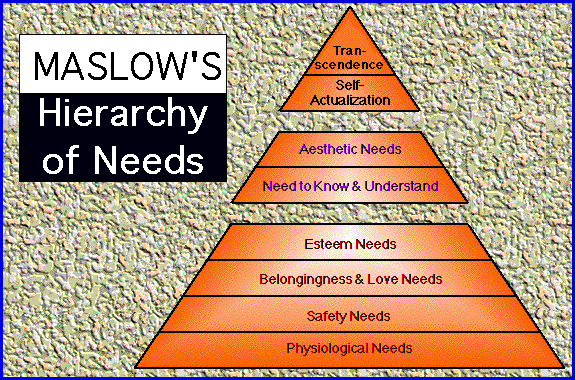 A successful learning environment is predicated on the idea that students feel safe and comfortable in their classroom and school. This is a sensible conclusion when you think about it. If a child is worried about something then chances are she is not completely focused on her work.
A successful learning environment is predicated on the idea that students feel safe and comfortable in their classroom and school. This is a sensible conclusion when you think about it. If a child is worried about something then chances are she is not completely focused on her work.
Abraham Maslow captured this concept in 1943 in a work called “A Theory of Human Motivation.” Maslow’s work set forth the idea that all human beings are driven by a set of hierarchical needs and that higher level needs cannot be attended to until lower level needs are met. The first two levels are physiological and safety. Learning falls into a set of higher level cognitive needs. This theory is why we ask kids who are struggling if they got a good night’s sleep or if they had breakfast. These basic physiological needs have a significant impact on their learning.
Beyond physiological needs is the need for safety. The child needs to know that they are physically and emotionally safe before they are able to attend to learning. Providing a safe and predictable environment for 600 students who come to learn with over 75 adult faculty members creates a dynamic challenge for a school.
To meet this challenge Ben-Hem faculty and staff have developed and implemented a system of School Wide Positive Behavior Supports (SWPBS). The SWPBS approach to school culture is predicated on the idea that human behavior is learned and, therefore, needs to be taught. It is the proactive approach to teaching positive behavioral expectations that separates SWPBS from traditional behavior management techniques.
The Open Circle program is one that families hear a lot about during curriculum nights and in teacher newsletters. The Open Circle program is Ben-Hem’s primary curriculum resource for teaching students what it means to be a friend and a student. The inter and intrapersonal skills developed through Open Circle are critical to ensuring our students are safe and successful in school. When programs like Open Circle are not used the social curriculum becomes the “hidden curriculum.” Open Circle supports our teachers in transferring this “hidden curriculum” into a clear and explicit trajectory of teaching and learning that provides the foundation of a positive school culture and climate.
Teaching is only the first step in this process. Instruction is most effective when the content and expectations are consistent from classroom to classroom and year to year. Stability and predictability are part of making sure those basic needs that Maslow described are met. To ensure that behavioral expectations are consistent in all classrooms and settings, our teachers use a common set of guiding principles when developing classroom rules. Providing fundamental principles ensures continuity of expectations while providing for flexibility in adapting rules and expectations to specific environments.
The social and emotional skills of our students are critically important to their success. Teaching and supporting the development of these skills and abilities is a high priority for Ben-Hem and one that we know ensures high levels of learning for our students. School Wide Positive Behavior Supports is an effective model that we implement to ensure this learning throughout the day and year. Let us know if you have any questions about social and emotional learning or School Wide Positive Behavior Supports.

